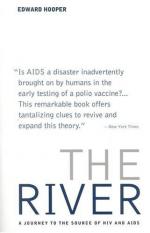|
This section contains 2,064 words (approx. 7 pages at 300 words per page) |

|
HIV, the human immunodeficiency virus, is the virus that causes AIDS, a debilitating and deadly disease of the human immune system. HIV is one of the world's most serious health problems: at the end of 2001, more than 40 million people worldwide were infected with HIV and living with the virus or AIDS. The World Health Organization estimates that about 20 million people have died from AIDS since the infection was first described in 1981. Nearly 500,000 of those deaths have occurred in the United States. Although there is no cure for the disease, therapies exist that reduce the symptoms of AIDS and can extend the life spans of HIV-infected individuals. Researchers are also pursuing protective vaccines, but a reliable vaccine might still require years to develop.
 The HIV virion (virus particle) has two glycoproteins on the outside, which aid its passage into human cells. It contains two copies of its RNA genome...
The HIV virion (virus particle) has two glycoproteins on the outside, which aid its passage into human cells. It contains two copies of its RNA genome...|
This section contains 2,064 words (approx. 7 pages at 300 words per page) |

|


